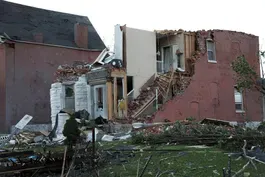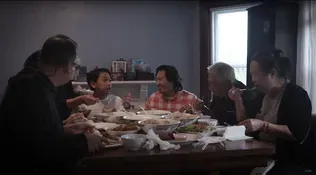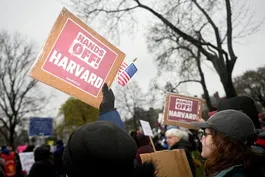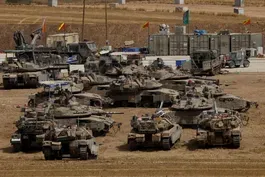
The largely forgotten history of Philadelphia’s MOVE bombing
Clip: 5/17/2025 | 6m 40sVideo has Closed Captions
The largely forgotten history of Philadelphia’s police bombing of Black organization MOVE
This week marked the 40th anniversary of one of the worst tragedies in Philadelphia’s history. In May 1985, the city’s police department dropped an improvised bomb on a residential home that housed the Black revolutionary organization MOVE. The bomb and ensuing fire killed 11 people, including five children, and destroyed more than 60 nearby homes. Ali Rogin reports.
Problems playing video? | Closed Captioning Feedback
Problems playing video? | Closed Captioning Feedback
Major corporate funding for the PBS News Hour is provided by BDO, BNSF, Consumer Cellular, American Cruise Lines, and Raymond James. Funding for the PBS NewsHour Weekend is provided by...

The largely forgotten history of Philadelphia’s MOVE bombing
Clip: 5/17/2025 | 6m 40sVideo has Closed Captions
This week marked the 40th anniversary of one of the worst tragedies in Philadelphia’s history. In May 1985, the city’s police department dropped an improvised bomb on a residential home that housed the Black revolutionary organization MOVE. The bomb and ensuing fire killed 11 people, including five children, and destroyed more than 60 nearby homes. Ali Rogin reports.
Problems playing video? | Closed Captioning Feedback
How to Watch PBS News Hour
PBS News Hour is available to stream on pbs.org and the free PBS App, available on iPhone, Apple TV, Android TV, Android smartphones, Amazon Fire TV, Amazon Fire Tablet, Roku, Samsung Smart TV, and Vizio.
Providing Support for PBS.org
Learn Moreabout PBS online sponsorshipJOHN YANG: This week marked the 40th anniversary of one of the worst tragedies in the history of Philadelphia.
In May 1985, the city's police department dropped an improvised bomb on a residential home that housed the black revolutionary organization called MOVE.
The bomb in the ensuing fire, killed 11 members of the group, including five children, and destroyed more than 60 nearby homes.
Ali Rogin reports on why so many are still coming to grips with what happened.
MAN: MOVE is a totally revolutionary organization.
ALI ROGIN (voice-over): The complicated story of MOVE begins in the early 1970s.
The organization followed the teachings of their founder, John Africa, who advocated a lifestyle rooted in nature.
All members took Africa's last name and lived communally in West Philadelphia.
MAN: We must fight back.
ALI ROGIN (voice-over): They were known for staging disruptive demonstrations and frequently clashing with authorities, protesting everything from police brutality and war to pet stores and zoos.
TOMMY OLIVER, Director, "40 Years a Prisoner": MOVE is and was an organization that's very much committed to life and all of its forms and whatever that looks like.
ALI ROGIN (voice-over): Tommy Oliver is the director of "40 Years a Prisoner," a 2020 HBO documentary that traces the group's origins.
TOMMY OLIVER: They're committed to eating naturally, to living naturally, to not being reliant on technology.
MIKE AFRICA JR., MOVE Organization: We walked around naked a lot as children.
The organization did not.
They believed in vitamin D from the sun.
They believed in allowing your skin to be tougher and stronger.
ALI ROGIN (voice-over): Mike Africa Jr. S parents were both members of MOVE.
MIKE AFRICA: Yes, it was unorthodox.
And yeah, some things were strange to some people, but for me, that was life.
ALI ROGIN (voice-over): That way of life often put MOVE at odds with local police and their neighbors who accused them of creating unsanitary living conditions.
TOMMY OLIVER: Conditions them trying to live in the way that they wanted to live didn't sit well with a lot of people.
So sometimes the neighbors, sometimes the city.
And it escalated pretty significantly pretty quickly.
ALI ROGIN (voice-over): In 1978, more than a year after the city issued an eviction notice, Philadelphia's then mayor, Frank Rizzo, ordered an attack on MOVE's home.
FRANK RIZZO, Former Philadelphia mayor: They're going to go either easy or hard way.
That can be standing up or laying down.
ALI ROGIN (voice-over): The months long standoff culminated in a shootout.
One police officer was killed and MOVE's home was demolished.
While MOVE maintains that the officer died by friendly fire, nine of its members were convicted and sentenced to up to 100 years in prison, including Mike Africa Jr.'s parents.
MIKE AFRICA: The mayor admitted that he believed my parents were innocent.
He believed that my parents were not in prison for the charge that they were charged with.
MAN: Police are inside MOVE headquarters in West Philadelphia conducting an intensive search for weapons.
ALI ROGIN (voice-over): He says the media's portrayal of MOVE was often exaggerated.
And he says the organization was misunderstood even among many African Americans.
MIKE AFRICA: MOVE members are not the turn the other cheek type people.
And a lot of people felt like pacifism was the answer.
And MOVE members were not pacifistic.
If a cop attacked them, they would fight back.
ALI ROGIN (voice-over): Tommy Oliver says those early confrontations, including that 1978 shootout, are critical to understanding what eventually happened.
TOMMY OLIVER: Seven years later, you had officers and members of the police force who wanted revenge.
ALI ROGIN (voice-over): In May of 1985, Philadelphia Mayor Wilson Good ordered the organization to be removed once again from a home where they were living.
WILSON GOOD, Former Philadelphia Mayor: What we have out there is war.
ALI ROGIN (voice-over): And on May 13, local news stations like WCAU in Philadelphia covered the escalating crisis throughout the day.
Police would fire more than 10,000 rounds of ammunition into MOVE's row house before eventually dropping a bomb on it.
The city's police commissioner at the time, Gregore Sambor, defended his officers that evening.
GREGORE SAMBOR, Police Commissioner: At no time did any police position fire in an offensive posture.
It was purely in a defensive posture.
ALI ROGIN (voice-over): Eleven MOVE members, including five children, were killed.
While no city officials were criminally charged.
A Philadelphia investigative commission later concluded that police actions were clearly excessive and, quote, unconscionable.
MIKE AFRICA: I don't think I'll ever recover or heal from what happened.
ALI ROGIN (voice-over): Mike Africa Jr. Who was six at the time of the bombing, is now working as the legacy director of MOVE.
He's reunited with his parents, who were released from prison in 2018 but remain on parole.
MIKE AFRICA: I've never heard of another case where a government has dropped a bomb on citizens in America.
This is not something that you can repair back to normal.
You have to find other ways to cope, and that's what I've been doing for the last 40 years.
ALI ROGIN (voice-over): In 2020, Philadelphia's City Council formally apologized for what happened, as has former mayor Wilson Good.
But Africa junior Says four decades later he'd like the city to create a permanent memorial to commemorate all that was lost that day.
ALI ROGIN: In your opinion, why do you feel that so few Americans know about the events that took place 40 years ago?
MIKE AFRICA: I think the city of Philadelphia does a really good job of limiting the amount of exposure to what happened.
I also think that MOVE history is a very controversial history that brings up a lot of trauma for a lot of people.
Black people were killed by law enforcement.
And, you know, if you saw what happened to George Floyd, and at a certain point, you're tired of hearing about the people that were getting killed by these police officers.
ALI ROGIN (voice-over): But that doesn't stop Mike Africa Jr. From his mission of making sure the history of MOVE and the tragic event that claimed 11 lives and forgotten.
For PBS News Weekend, I'm Ali Rogin.
News Wrap: Deadly storms rip through Kentucky and Missouri
Video has Closed Captions
Clip: 5/17/2025 | 3m | News Wrap: Deadly storms rip through Kentucky and Missouri (3m)
Tracing one Hmong family’s journey from Laos to Rhode Island
Video has Closed Captions
Clip: 5/17/2025 | 4m 33s | Tracing one Hmong family’s journey from Laos to Rhode Island (4m 33s)
Trump’s escalating feud with Harvard affects cancer research
Video has Closed Captions
Clip: 5/17/2025 | 4m 39s | Trump administration’s escalating feud with Harvard affects breast cancer research (4m 39s)
Why Israel is mobilizing a new ground assault on Gaza
Video has Closed Captions
Clip: 5/17/2025 | 4m 42s | Israel mobilizes new ground assault on Gaza to pressure Hamas into freeing hostages (4m 42s)
Providing Support for PBS.org
Learn Moreabout PBS online sponsorshipSupport for PBS provided by:
Major corporate funding for the PBS News Hour is provided by BDO, BNSF, Consumer Cellular, American Cruise Lines, and Raymond James. Funding for the PBS NewsHour Weekend is provided by...















